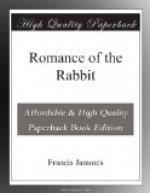And one of the dogs with the spiked collars advanced. It was the spaniel, Rabbit’s friend. Like the wolf she had already suffered bitterly with hunger and her teeth chattered. Her ears were wrinkled even when she raised them, and her straggly tail which looked like tufts of cotton she held out rigid and motionless. Her eyes of the color of yellow raspberries were fixed on Francis with the ardor of absolute Faith. And her two companions, who trustfully were getting ready to listen to her, lowered their heads in sign of their ignorance and goodwill. They were shepherd dogs, who had never heard anything but the sob of the sheep-bells, the bleating of the flocks and the lash-like crack of the lightning on the summits, and, proud and happy, they waited while the little spaniel bore witness.
She took a step forward. But not a sound came from her throat. She licked the hand of Francis, and then lay down at his feet.
And the ewe bleated.
Her bleats were so full of sadness that it seemed as if she were already exhaling her soul toward death at the very thought of leaving Francis. As she stood there in silence, her lamb, seized by some strange melancholy, was suddenly heard, crying like a child.
And the ewe spoke:
“Neither the placidity of grassy meadows toned down by the mists of the dawn, nor the sweet woods of the mountains dotted by the fog with the pearls of its silvery sweat, nor the beds of straw of the smoke-filled cabins, are in any way comparable to the pasture-grounds of your heart. Rather than leave you we should prefer the bloody and loathful slaughter-house, and the rocking of the cart on which we are carried thither with our legs tied and our flanks and cheeks on the boards. Oh Francis, it would be like unto death to us to lose you, for we love you.”
And while the sheep spoke the owl and the hawks, perched near one another, remained motionless, their eyes full of anguish and their wings pressed close to their sides lest they fly away.
The last one to speak was Rabbit.
Clothed in his fur of the color of stubble and earth he seemed like a god of the fields. In the midst of the wintry waste he was like a clod of earth of the summer time. He made one think of a road-mender or a rural postman. Tucked up in the windings of his flapping ears he carried with himself the agitation of all sounds. One of the ears, extended toward the ground, listened to the crackling of the frost, while the other, open to the distance, gathered in the blows of an axe with which the dead forest resounded.
“Surely, Oh Francis,” he said, “I can be satisfied with the mossgrown bark which has grown tender beneath the caress of the snows and which wintry dawns have made fragrant. More than once have I satisfied my hunger with it during these disastrous days when the briars have turned into rose-colored crystals, and when the agile wagtail utters its shrill cry toward the larvae which its beak can no longer reach beneath the ice along the banks. I shall continue to gnaw these barks. For, Oh Francis, I do not wish to die with these gentle friends who are in their agony, but rather I wish to live beside you and obtain my sustenance from the bitter fiber of the trees.”




